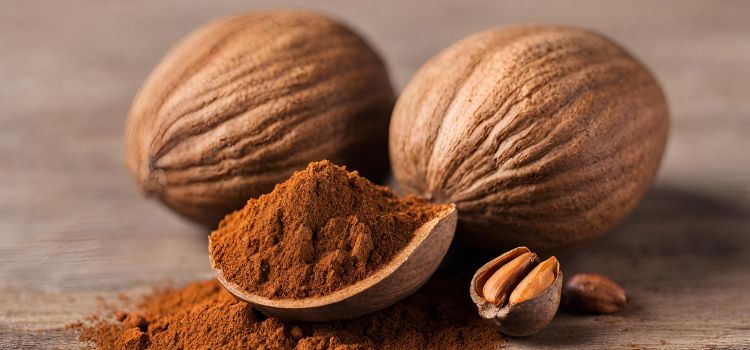Yes, nutmeg is generally considered safe to consume during pregnancy. Nutmeg is a popular spice that is commonly used in cooking and baking, known for its warm and slightly sweet flavor.

I found out that nutmeg contains beneficial compounds like antioxidants, minerals, and vitamins. However, I learned that pregnant women should consume nutmeg in moderation because excessive intake may have potential risks. It’s always a good idea to consult with a healthcare professional before including nutmeg in your diet during pregnancy.
We will explore the safety, potential benefits, and risks associated with nutmeg consumption during pregnancy, helping you make an informed decision about its inclusion in your diet.
The Safety Concerns Of Nutmeg
Nutmeg safety concerns during pregnancy: Myth or reality? Let’s discover the truth behind the debate and make an informed decision for you and your baby’s well-being.
Exploring The Claims And Counterclaims Surrounding Nutmeg Consumption During Pregnancy
Is it safe to consume nutmeg during pregnancy? This is a question that often arises, as pregnant women are cautious about their diet and want to ensure the safety of the food they eat.
Let’s delve into the safety concerns surrounding nutmeg and uncover the truth behind the claims and counterclaims.
Shedding Light On The Potential Risks Associated With Nutmeg Consumption
Nutmeg is a commonly used spice in various cuisines, but some concerns have been raised regarding its safety during pregnancy. Here are the potential risks associated with nutmeg consumption:
- Risk of miscarriage: There are claims that consuming excessive amounts of nutmeg during pregnancy can increase the risk of miscarriage. However, scientific evidence to support this claim is limited.
- Potential toxic effects: Nutmeg contains a compound called myristicin, which in large amounts can have psychoactive effects. Some believe that this compound can be harmful to the developing fetus. However, the amount of myristicin present in normal culinary usage of nutmeg is unlikely to cause harm.
Examining Scientific Studies And Expert Opinions To Uncover The Truth
To determine the truth behind these claims and counterclaims, it is crucial to examine the scientific studies and expert opinions on the matter:
- Limited scientific evidence: There is a lack of extensive scientific research specifically focused on the effects of nutmeg consumption during pregnancy. Most studies have been conducted on animals or in vitro, making it difficult to draw definitive conclusions for human pregnancy.
- Expert opinions: Experts in the field have provided varying opinions on the safety of nutmeg during pregnancy. Some suggest avoiding excessive consumption due to the potential risks associated with myristicin, while others believe that the amounts typically used in cooking are safe.
The safety concerns surrounding nutmeg consumption during pregnancy are still subject to debate. While there have been claims of potential risks, the limited scientific evidence and varying expert opinions make it challenging to provide a definitive answer.
It is always wise to consult a healthcare professional for personalized advice regarding nutmeg consumption and any other dietary concerns during pregnancy.
Understanding The Properties And Effects Of Nutmeg

Nutmeg, a popular spice known for its rich flavor and aroma, has been a staple in many cuisines for centuries. However, when it comes to consuming nutmeg during pregnancy, there are lingering concerns about its safety.
Let’s take a closer look at the chemical composition of nutmeg and its impact on the body, evaluate the potential effects of nutmeg on the developing fetus, and unveil any connections between nutmeg and pregnancy complications.
A Closer Look At The Chemical Composition Of Nutmeg And Its Impact On The Body
- Myristicin: Nutmeg contains a chemical compound called myristicin, which gives it its distinct flavor. In large amounts, myristicin can have psychoactive effects and is even used as a natural hallucinogen. However, the levels of myristicin found in culinary use are generally considered safe.
- Essential oils: Nutmeg also contains essential oils, such as eugenol, safrole, and elemicin. These oils contribute to its aromatic properties but may pose concerns when consumed in excessive amounts or concentrated forms.
- Antimicrobial properties: Nutmeg has long been recognized for its antimicrobial properties, which can aid in combating various infections in the body.
- Digestive benefits: Traditionally, nutmeg has been used to aid digestion and relieve stomach discomfort. Its compound called terpenes may play a role in promoting healthy digestion.
Evaluating The Potential Effects Of Nutmeg On The Developing Fetus
- Limited research: There is a lack of comprehensive studies specifically focused on the effects of nutmeg consumption during pregnancy. As a result, it is difficult to draw concrete conclusions on its safety.
- High doses and adverse effects: Some animal studies suggest that consuming high doses of nutmeg may lead to potential risks, including developmental issues in the fetus. However, it’s important to note that these studies used levels of nutmeg that were significantly higher than what would typically be consumed in culinary use.
- Individual sensitivity: Each pregnancy and individual is unique, with varying sensitivities to certain foods. It’s always a good idea to consult with a healthcare professional before making any dietary changes or introducing new spices during pregnancy.
Unveiling The Connection Between Nutmeg And Pregnancy Complications
- Preterm labor: There are anecdotal reports suggesting that excessive nutmeg consumption, particularly in concentrated forms, may increase the risk of preterm labor. However, more scientific evidence is needed to establish a definitive connection.
- Allergic reactions: Nutmeg can potentially trigger allergic reactions in some individuals. Allergies can vary from person to person, so it’s important to be mindful of any adverse reactions and seek medical advice if necessary.
- Other considerations: Pregnancy is a sensitive period, and it’s prudent for expectant mothers to prioritize a balanced and nutritious diet. While nutmeg used in culinary proportions is generally considered safe, it’s advisable to consume it in moderation and be aware of any personal sensitivities or allergies.
Nutmeg Consumption Guidelines For Expectant Mothers

Nutmeg consumption during pregnancy should be approached with caution. It’s best to consult with a healthcare professional for safety guidelines and recommendations.
Expert Recommendations On Safe Nutmeg Consumption During Pregnancy
Nutmeg, with its warm and aromatic flavor, is a popular spice used in various culinary dishes. However, when it comes to pregnancy, expectant mothers should exercise caution and be aware of the guidelines for safe nutmeg consumption.
Here are some expert recommendations to consider when it comes to consuming nutmeg during pregnancy:
Nutmeg Dosage and Frequency:
- Limit your intake to culinary amounts found in recipes, as excessive consumption may lead to potential risks.
- It is generally safe to include a pinch or two of nutmeg in your dishes occasionally.
- Avoid excessive use, as nutmeg contains a compound called myristicin that, in large quantities, can have psychoactive effects.
Alternatives and Substitutions:
- If you are concerned about nutmeg consumption, there are various alternatives and substitutions available to enhance the flavor of your culinary creations.
- Consider trying cinnamon, ginger, allspice, or cardamom to add a similar warmth and depth to your dishes.
- Experimenting with these alternatives will not only diversify the flavors but will also ensure a safe and enjoyable culinary experience during pregnancy.
Always remember, moderation is key during pregnancy. Following these guidelines and consulting with your healthcare provider will help ensure a safe and healthy pregnancy journey.
Precautions And Recommendations Of Nutmeg During Pregnancy
During pregnancy, it’s important to prioritize the health and well-being of both the mother and the developing baby. Open communication with healthcare providers is crucial to ensure a safe pregnancy journey. Here are some key points to consider:
Highlighting The Importance Of Open Communication With Healthcare Providers
- Regularly consult with your healthcare provider throughout your pregnancy journey.
- Keep them informed about any changes in your diet or if you’re considering incorporating nutmeg.
- Discuss any existing medical conditions or concerns you may have.
- Seek advice before making any major changes to your diet.
Discussing Potential Allergic Reactions Or Adverse Effects Of Nutmeg On Pregnant Women
Although nutmeg is generally safe when used in moderation, some individuals may have allergies or sensitivities to it. Allergic reactions may include symptoms such as skin rashes, itching, swelling, or difficulty breathing.
Adverse effects of excessive nutmeg consumption may include nausea, dizziness, or even hallucinations in extreme cases. If you experience any unusual symptoms after consuming nutmeg, it is essential to seek immediate medical attention.
Sharing Tips On Maintaining A Balanced And Healthy Diet During Pregnancy
Maintaining a balanced and healthy diet is crucial for both the mother and the baby’s development. Here are some tips to consider:
- Consume a variety of fruits, vegetables, and whole grains to ensure you receive essential vitamins, minerals, and fiber.
- Include lean proteins such as poultry, fish, legumes, and tofu in your diet.
- Stay hydrated by drinking plenty of water throughout the day.
- Limit processed foods, sugary beverages, and excessive sodium intake.
- Incorporate healthy fats from sources like avocados, nuts, and seeds.
- Consider taking prenatal vitamins to supplement your diet, as recommended by your healthcare provider.
Remember, maintaining open communication with your healthcare provider, being aware of potential allergic reactions or adverse effects of nutmeg, and following a balanced and healthy diet are essential steps in ensuring a safe and healthy pregnancy journey.
Nutmeg In Traditional And Alternative Medicine

Nutmeg, a popular spice, has been used in traditional and alternative medicine for various purposes. However, when it comes to its safety during pregnancy, it is important to exercise caution and consult with a healthcare professional for guidance.
Nutmeg should be used in moderation and under expert supervision to ensure the well-being of both the mother and the baby. Nutmeg, with its warm and distinct flavor, has been a staple in traditional and alternative medicine practices for centuries. The use of nutmeg during pregnancy, however, has raised concerns among expecting mothers.
In this section, we will explore the historical context of nutmeg in traditional and cultural practices, its applications in alternative medicine during pregnancy, and the risks and benefits of incorporating nutmeg into holistic pregnancy practices.
Understanding The Historical Usage Of Nutmeg In Traditional And Cultural Contexts
Nutmeg has a long history of being used as a culinary and medicinal spice in various cultures around the world. In traditional medicine, nutmeg has been utilized for its potential to relieve digestive issues, reduce pain and inflammation, and improve sleep quality.
It has also been incorporated into cultural rituals and practices, believed to have protective and purifying properties. Ancient civilizations valued nutmeg for its perceived aphrodisiac and stimulating qualities, considering it an essential ingredient in love potions.
Analyzing The Applications Of Nutmeg In Alternative Medicine During Pregnancy
Some alternative medicine practices suggest using nutmeg during pregnancy to ease morning sickness and digestive discomfort. Nutmeg is believed to have antibacterial properties, which may help combat certain infections during pregnancy.
Additionally, nutmeg is said to promote better sleep and relaxation, which can be beneficial for expectant mothers experiencing insomnia or anxiety. However, it’s important to note that scientific research on the safety and efficacy of nutmeg during pregnancy is limited, making it crucial to approach its use with caution.
Weighing The Risks And Benefits Of Incorporating Nutmeg Into Holistic Pregnancy Practices
- While nutmeg may offer potential benefits, it is essential to consider the risks associated with its use during pregnancy.
- Nutmeg contains compounds that can act as a hallucinogen in high doses, potentially leading to adverse effects on both the mother and the developing fetus.
- Consuming excessive amounts of nutmeg during pregnancy may result in nausea, dizziness, palpitations, and even hallucinations.
- Due to these risks, it is advisable to consult with a healthcare professional or a qualified herbalist before incorporating nutmeg into your holistic pregnancy practices.
Nutmeg has a rich history in traditional and alternative medicine, but its safety during pregnancy is not well-established. While some practitioners suggest its use to alleviate certain pregnancy discomforts, it is crucial to exercise caution and seek guidance from healthcare professionals.
Remember, the well-being of both mother and child should always be the top priority in any holistic pregnancy practice.
Summarizing The Key Points And Insights From The Article
- Nutmeg contains a compound called myristicin, which in high doses, has been found to have hallucinogenic properties. However, the consumption of nutmeg in typical culinary amounts is unlikely to pose any risks during pregnancy.
- While there is limited scientific research specifically on the safety of nutmeg during pregnancy, experts suggest that moderate consumption of nutmeg as a spice in cooking is generally considered safe.
- Nutmeg is often used in small amounts in recipes, and the concentration of myristicin in these quantities is unlikely to cause any harm to the developing fetus.
- It is important to note that excessive consumption of nutmeg or using it in large amounts for its potential medicinal properties may lead to adverse effects and is not recommended during pregnancy.
- Always consult with your healthcare provider before incorporating any new foods or spices into your diet during pregnancy.
Encouraging Readers To Make Informed Decisions
Pregnant women should always prioritize their health and the well-being of their unborn child. While nutmeg is generally considered safe when used in regular culinary amounts, it is important to consult with a healthcare provider before making any significant dietary changes during pregnancy.
Each pregnancy is unique, and individual circumstances may vary. It is crucial to consider any pre-existing health conditions, allergies, or sensitivities before consuming nutmeg or any other new food or spice.
If you are unsure about whether to include nutmeg in your diet during pregnancy, it is best to err on the side of caution and seek professional advice. Ultimately, the final decision should be based on discussions with your healthcare provider, who can provide personalized guidance tailored to your specific needs.
Remember, the information provided here is not a substitute for medical advice. Always consult with a qualified healthcare professional before making any significant dietary changes during pregnancy.
Frequently Asked Questions For Is Nutmeg Safe During Pregnancy
Can You Eat Nutmeg If Pregnant?
It is safe to avoid eating nutmeg while pregnant.
Which Spices Should Be Avoided During Pregnancy?
Avoid consuming spices such as cinnamon, black pepper, chili powder, and ginger during pregnancy.
How Much Nutmeg Is Too Much In Pregnancy?
Excessive nutmeg consumption during pregnancy can be harmful. It’s best to avoid consuming too much nutmeg while pregnant.
Is Nutmeg Good For Baby?
Yes, nutmeg is not recommended for babies as it can cause stomach upset and other adverse reactions.
Conclusion
Overall, it is important for pregnant women to exercise caution when consuming nutmeg. While it has been found to have potential health benefits, including relieving digestive issues and reducing inflammation, the high levels of myristicin present in nutmeg can be harmful during pregnancy if consumed in excess.
It is advisable to consult with a healthcare professional before adding nutmeg to your diet during pregnancy. Moderation is key, and it is best to be aware of any potential allergies or drug interactions that may occur. As always, the safety and well-being of the mother and baby should be the top priority.
It is suggested to opt for alternative spices and herbs that are known to be safe during pregnancy to ensure a healthy and happy pregnancy journey.
Leave a Reply